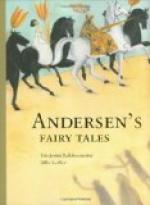“Kribledy, krabledy—plump!” down fell somebody: it was a wooden bird, the popinjay used at the shooting-matches at Prastoe. Now he said that there were just as many inhabitants as he had nails in his body; and he was very proud. “Thorwaldsen lived almost next door to me.* Plump! Here I lie capitally.”
* Prastoe, a still smaller town than Kjoge. Some hundred paces from it lies the manor-house Ny Soe, where Thorwaldsen, the famed sculptor, generally sojourned during his stay in Denmark, and where he called many of his immortal works into existence.
But little Tuk was no longer lying down: all at once he was on horseback. On he went at full gallop, still galloping on and on. A knight with a gleaming plume, and most magnificently dressed, held him before him on the horse, and thus they rode through the wood to the old town of Bordingborg, and that was a large and very lively town. High towers rose from the castle of the king, and the brightness of many candles streamed from all the windows; within was dance and song, and King Waldemar and the young, richly-attired maids of honor danced together. The morn now came; and as soon as the sun appeared, the whole town and the king’s palace crumbled together, and one tower after the other; and at last only a single one remained standing where the castle had been before,* and the town was so small and poor, and the school boys came along with their books under their arms, and said, “2000 inhabitants!” but that was not true, for there were not so many.
Bordingborg, in the reign of King Waldemar, a considerable place, now an unimportant little town. One solitary tower only, and some remains of a wall, show where the castle once stood.
And little Tukey lay in his bed: it seemed to him as if he dreamed, and yet as if he were not dreaming; however, somebody was close beside him.
“Little Tukey! Little Tukey!” cried someone near. It was a seaman, quite a little personage, so little as if he were a midshipman; but a midshipman it was not.
“Many remembrances from Corsor.* That is a town that is just rising into importance; a lively town that has steam-boats and stagecoaches: formerly people called it ugly, but that is no longer true. I lie on the sea,” said Corsor; “I have high roads and gardens, and I have given birth to a poet who was witty and amusing, which all poets are not. I once intended to equip a ship that was to sail all round the earth; but I did not do it, although I could have done so: and then, too, I smell so deliciously, for close before the gate bloom the most beautiful roses.”
Corsor, on the Great Belt, called, formerly, before the introduction of steam-vessels, when travellers were often obliged to wait a long time for a favorable wind, “the most tiresome of towns.” The poet Baggesen was born here.




